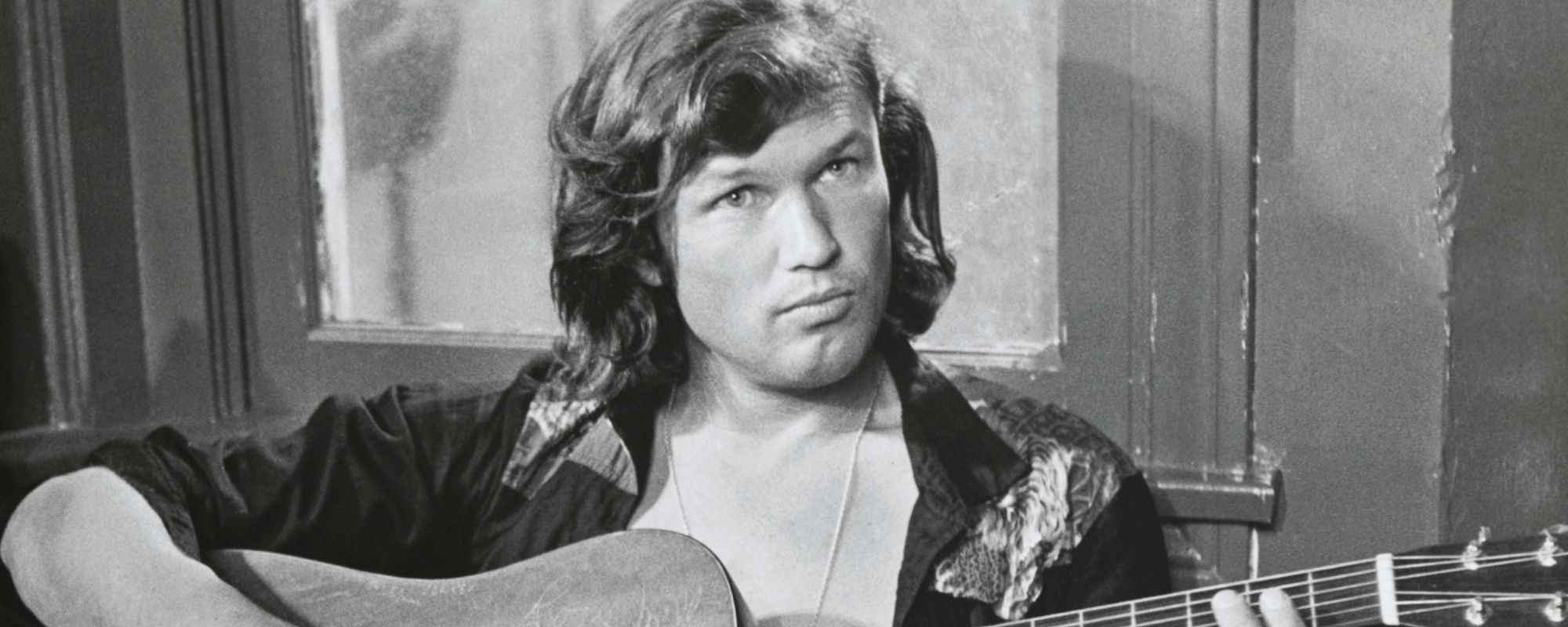Songwriting is a mystery. Why are some of us able to boil down emotions into a melody or sum up our lives in a stanza, while others cannot? When you speak to a wealth of songwriters about their process, one irrefutable fact comes into focus: Songwriting is undoubtedly not a science, but an inexplicable art form.
Videos by American Songwriter
One rising singer-songwriter, Alex Amen, got as close as I’ve ever heard to summing up that “inexplicable” conundrum, saying, “It’s like giving an answer for where life comes from…No one really has the answer.” Like trying to reckon with the immense mystery of life, there is no reason to try to nail down the art of songwriting. Instead, it’s better to enjoy the gift when it presents itself. Amen certainly has that gift.
When you first hear his music, you’d be forgiven for thinking that Amen is some forgotten talent from several decades ago, instead of the up-and-comer he is. His music has a transportive quality about it. Upon clicking “play” on his first EP, The Zorthian Tapes, you’ll be washed with a sense of nostalgia for the ’70s folk scene, whether you were there to witness it or not.
Everything about Amen speaks to a bygone era. From his appearance (which bears a striking resemblance to James Taylor) to his antiquated recording process (straight-to-tape) or handmade vinyl sleeves (quite a labor of love), Amen has rejected the 21st century in a way that seems impossible, given the current demands of the music industry. That rejection is what makes him so refreshing. In an age of quick turnaround and rinse-and-repeat albums, Amen is taking his time.
Amen’s long game can be elucidated in one song, “California Blues.” This upbeat, guitar-forward track is The Zorthian Tapes‘ hit potential. The simple verses give way to a layered chorus with timelessly effective harmonies. Much to my surprise, given how in tune with his current sound this song seems to be, Amen penned “California Blues” years before its release, when he was just 14 years old.
Amen was born in Texas, but has since taken to a wayfaring kind of life. When I spoke to him, he had just completed a 13-hour sailboat trek in the Pacific Northwest. Elsewhere in his life, he has spent time in a Californian commune and had a stint in isolation in Washington State. Needless to say, Amen is a well-traveled individual. But “California Blues” came at a time when California was merely an emblem of success or musical heritage in Amen’s mind. Like many of us who are not from the West Coast, Amen pictured what life must be like in the Golden State. He threw in a couple of references to heartbreak and had himself a song.
“I wrote that song before I even knew what California really was,” Amen tells American Songwriter. “And when I moved there years later, it hit the nail on the head of how I felt.” As it turns out, he has a prescient streak that has served him well on his latest release.
Because Amen has moved around so much in his life, it was worth asking him how his immediate surroundings impact his songwriting. His answer proved to be consequential in understanding his approach to the craft.
“Where you are, who you’re around, and what you’re doing—those things are what, for me at least, make a song,” Amen says.
He described The Zorthian Tapes in terms of colors, emotions, and environments. The hazy blue-tinged EP cover is indicative of life in the Pacific Northwest: “rainy, dark, and beautiful.” You get a real sense of place when listening to this project. Unlike the music that he teased he is working on now (which will be markedly more upbeat and sunnier, thanks to his move back to California), the songs on The Zorthian Tapes are moody morsels of life in the depths of isolation and heartbreak. It was written in an “intense” period in Amen’s life, and that intensity is duly felt while listening to it.
While the direct inspiration for Amen’s songwriting is his lived experiences, we can’t avoid the elephant in the room: Amen’s sonic direction is unmistakably borrowed from his predecessors.
Amen is well aware of his John Denver comparisons. It’s likely the first thing listeners notice when diving into Amen’s catalog. In my opinion, that kind of soft, intentional songwriting has been sorely missed in today’s music scene, but at any rate, Amen says that his Denver-esque sound wasn’t intentional. Instead, it simply found its way into his bones after so many years of listening to the “Country Roads” singer in childhood.
“I think people will always draw the comparison,” Amen says without any air of grievance.
What could be a pale pastiche is bolstered by raw and irrefutable talent. He might call Denver to mind, but his sense of poetry is all his own and doesn’t come off as an imitation. Like Denver, Amen sums up his worldview succinctly and viscerally over lulling guitar tones, but it is undoubtedly his worldview and not anyone else’s.
One song on the EP that genuinely feels like you’re watching the world through Amen’s eyes is “And Her Colors.” Amen made it a point to highlight this song in our conversation. According to him, he “knew it wouldn’t stream well,” but he regards it as the “most interesting” track, from a songwriting perspective.
Written in iambic pentameter, “And Her Colors” speaks to the struggle of enduring winter in the Pacific Northwest, waiting for the day the sun finally breaks through again. As the rains fell heavy / into my home / and stillness passed by the frozen gate / I wondered who covered my shining sun, he sings in this somber ballad. “And Her Colors” rhymes exactly zero times and has very little about it, on the surface, that drives repeat listens. And yet, it has a mystifying allure.
“That song feels very alive to me,” Amen says of “And Her Colors.” Recorded in just a few takes, this bittersweet track offers an intimate glimpse into the mind of this poignant balladeer.
While dealing with heartbreak on The Zorthian Tapes, Amen also found himself face-to-face with the fragility of life. Suffering the loss of his grandmother, Amen developed an anxiety about how “Finite life is.”
“I’ve been really existential,” Amen says. “I’m very aware of my existence and everybody’s existence–the finite nature of this whole thing. I’m having one of those quarter-life crises.” In talking about his grandmother’s passing, he added, “[Death] is a good mystery that dangles over all of us.”
He more or less boiled down that existentialism into a stand-alone track he recently released, “Hello Old Man.” According to Amen, his grandfather has been an integral part of his musical journey for a long time. “I think a lot of people basically have to get disowned to be musicians, but with my grandfather, I have always felt this extreme acceptance,” Amen says.
After getting gifted a guitar from his grandfather, Amen penned this heartbreakingly sobering song about growing old. It’s a heavy listen in many ways–a fact Amen was aware of when he wrote it.
“Some songs have heavy energy—they come out fully formed, and you know right away they’re something special,” he says.
Amen may be able to pinpoint specific people or places that have inspired his music, but that doesn’t mean he knows precisely how his songs come to be. The beauty in Amen’s approach to songwriting lies in his acceptance that his ability to express himself will always be intertwined with something inexplicable–this unknown force that separates the artists of the world.
As Amen moves forward in his career, he continues to write and wander. He’s not trying to figure out the mystery of it all; instead, he is just “grateful for the experience.” He’s living and creating all at the same time, letting one inform the other.
Credit: ATC Management / Sean Blackall













Leave a Reply
Only members can comment. Become a member. Already a member? Log in.